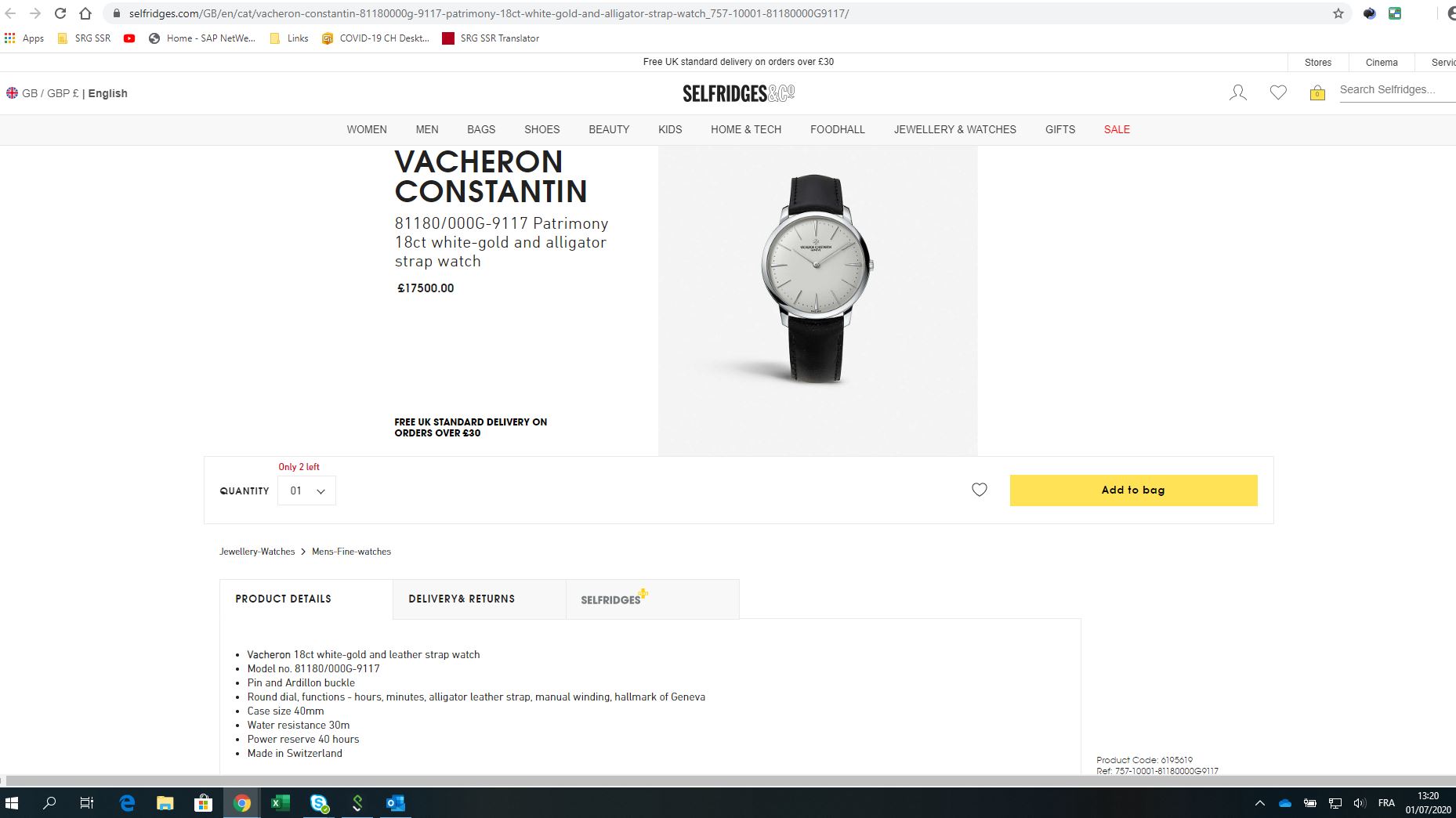
Is it time to say goodbye to exotic leather watch straps?

Straps made from alligator or other reptile skins have become a mainstay of Swiss luxury timepieces but a ban in California is forcing a rethink.
September 2019 was a great month for animal rights groups. Legislators in California decided that a long-awaited ban on the sale of alligator and crocodile skin would come into effect from 2020. It was bad news for alligator hunters and farmers in Louisiana and Florida, as well as luxury retailers in Beverly Hills selling crocodile and alligator skin shoes, belts and handbags who lobbied against the ban. Shops in California selling high-end Swiss timepieces with alligator straps were also worried about their inventory.
“Some brands sent in replacement straps to put on stock watches, and some brands did not address it at all,” says Jamie Hays of the Feldmar Watch Company which has shops in Los Angeles and Beverly Hills.
The situation became even more complicated when two last-ditch lawsuits against the California ban were filed at the last minute: one by the Louisiana Department of Wildlife and Fisheries and the other jointly by a group of Louisiana alligator farmers and California luxury retailers. As a result, the ban was temporarily put on hold and the final decision hangs in the balance with the coronavirus pandemic potentially affecting court hearings scheduled this year.
“It was very anticlimactic in the end. We all had plans to be prepared for the worst, and at this point there is nothing to do,” says Hays.
There is still a fair chance that proponents of the ban will win in the California courts. Of course, watch collectors could always drive to a neighbouring state to buy a Swiss watch with an alligator bracelet. But California’s pioneering policies – from marijuana legalisation to introducing a minimum wage – often influence the rest of America and even the rest of the world. At the very least, the California ban has alerted Swiss watch brands to the financial risk of continuing with a strategy of “business as usual”.
Sustainable vs ethical
“Luxury brands are ditching animal-derived materials, including exotic skins, in response to growing consumer demand for sustainable and ethical products,” says Sophia Charchuk of the group People for the Ethical Treatment of Animals (PETA) which lobbied hard for implementation of the California ban. “Any brand that doesn’t want to be left behind by the largest shopping demographic—Gen Z and millennials, who opt for cruelty-free products—should ban exotic skins.”
Many high-end brands have said no to exotic reptile skins in recent years. For example, London upmarket retailer Selfridges announced that they would no longer stock products that use exotic skins like alligator, crocodile or python from February 2020 onwards. However, watch straps appear to have escaped their notice. As of July 1, Selfridges’ online store was selling 13 luxury Swiss watches with alligator straps: six Vacheron Constantin models, three Zenith, two Longines, one Girard-Perregaux and one Carl F. Bucherer.

When confronted by animal rights groups on the ethics of using exotic straps, Swiss watch brands claim they only use sustainable sources that do not endanger the survival of a species. In 2010, the Swatch Group – which owns luxury brands like Omega, Breguet and Longines – stopped using leather straps from crocodiles, snakes, rays, and sharks but alligator still accounts for around 10% of all leather straps.
“Our use of so-called exotic leather is limited to the Alligator mississippiensis species, which is sourced from very few, clearly identified, controlled, and sustainable farming operations in southeastern US states,” says a Swatch Group representative.
However, PETA is not convinced that animal welfare is a priority at these alligator farms.
“Alligators killed for their skin are raised in crowded, dark sheds and fetid water before they’re stabbed in the spine,” says Charchuk.

What next?
Shocking images that emerged in 2010 from Indonesia showing pythons and lizards being skinned alive led to a reflection on the sourcing of reptile skins from abroad. Last year, under the leadership of Switzerland, the World Organisation for Animal Health (OIE) adopted guidelines for humane killing of reptiles in the leather industry for the first time. It was the Swiss Federal Food Safety and Veterinary Office that initiated and then led the drafting of the “Killing of reptiles for their skins, meat and other products” chapterExternal link in the OIE’s Terrestrial Animal Health Code which was then formally adopted. The recommendations deem certain inhumane killing methods like freezing, boiling, suffocation, drowning or live skinning unacceptable.
Not surprisingly, PETA wants all killing of reptiles for leather to stop. The organisation wants luxury companies to switch to alternative materials.
“Sustainable, eco-friendly vegan materials and recent textile advances—such as plant-based polymers and recycled polyurethanes as well as materials made from cork oak bark, pineapple leaves, mulberry leaves, and mushrooms—are revolutionising the fashion market and proving that we don’t have to sacrifice style in order to be kind to animals and the planet,” says Charchuk.
The problem in the watch industry is not so much the lack of alternatives but a question of image. The exotic leather strap has become an important luxury element of a high-end Swiss watch. The Swatch Group told swissinfo.ch that there is a “strong customer demand” for these alligator leather straps. Some Swiss watch brands have adopted the potential compromise of crocodile and alligator-embossed straps which look like the real deal but are made from cow and calf leather.
But whichever path the watch industry chooses to take on materials for its high-end straps, the pending California ban shows that ignoring the issue is not an option anymore. The Swiss watch industry can ill afford another hit given that the value of watch exports has fallen by over a third in the first half of this year largely due to the Covid-19 pandemic.
Following the publication of this article, Selfridges reached out to swissinfo.ch. A representative claimed that there was an error with the online product descriptions which Selfridges will rectify to make it clear to their customers that the watch straps are not made of exotic leather. However, swissinfo.ch cannot verify this statement.

In compliance with the JTI standards
More: SWI swissinfo.ch certified by the Journalism Trust Initiative
















![The four-metre-long painting "Sonntag der Bergbauern" [Sunday of the Mountain Farmers, 1923-24/26] had to be removed by a crane from the German Chancellery in Berlin for the exhibition in Bern.](https://www.swissinfo.ch/content/wp-content/uploads/sites/13/2025/12/01_Pressebild_KirchnerxKirchner.jpg?ver=1af8ac75)















You can find an overview of ongoing debates with our journalists here . Please join us!
If you want to start a conversation about a topic raised in this article or want to report factual errors, email us at english@swissinfo.ch.